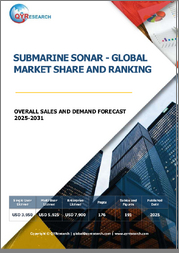
|
시장보고서
상품코드
1642450
소나 시스템 시장 보고서 : 동작 모드별, 제품 유형별, 설치별, 유형별, 용도별, 소재별, 지역별(2025-2033년)Sonar Systems Market Report by Mode of Operation, Product Type, Installation, Type, Application, Material, and Region 2025-2033 |
||||||
세계의 소나 시스템 시장 규모는 2024년에 49억 7,000만 달러에 달했습니다. 향후 IMARC Group은 2033년에는 58억 3,000만 달러에 달하며, 2025-2033년에 1.78%의 성장률(CAGR)을 보일 것으로 예측하고 있습니다. 이 시장은 해양 안보와 방위에 대한 수요 증가, 해양생물 및 생식 환경의 조사를 포함한 해양 생태계 모니터링에 대한 요구의 증가, 환경 모니터링과 보전 활동에 대한 주목의 증가 등을 배경으로 꾸준한 성장을 달성하고 있습니다.
소나 시스템 시장 동향
해양 안보와 국방의 필요성
전 세계에서 해양 안보 및 국방에 대한 수요가 증가하면서 시장 성장을 촉진하고 있습니다. 또한 지정학적 긴장과 영토 분쟁 증가로 인해 각국은 해군 역량에 대한 대규모 투자를 추진하고 있습니다. 소나 시스템은 이러한 노력의 최전선에 있으며, 첨단 수중 감지, 추적 및 위협 식별 능력을 제공합니다. 소나 시스템은 연안 해역의 안전을 보장하고 해상 교통을 감시하며 해상 자산을 보호하는 데 필수적입니다. 각국이 해군 함대를 현대화하고 수중 감시 능력을 강화하기 위해 노력함에 따라 최첨단 소나 시스템에 대한 수요가 증가하고 있습니다. 또한 잠수함전 및 수중 드론과 같은 비대칭 위협의 출현은 첨단 소나 기술의 중요성을 강조하며 시장 성장을 더욱 촉진하고 있습니다.
수중 감시 및 조사
소나 시스템은 다양한 수중 감시 및 조사 용도로 활용되고 있습니다. 해양 생물과 서식지 조사 등 해양 생태계를 쉽게 모니터링할 수 있습니다. 또한 연구자들은 수중 수중 음파감지기를 사용하여 수몰된 유적지를 탐색하는 고고학 탐사에 의존하고 있습니다. 이러한 시스템은 해양 생물의 움직임을 추적하고 기후 변화가 해양에 미치는 영향을 평가하는 데 필수적입니다. 또한 수중 음파감지기는 수색 및 구조 활동에서도 중요한 역할을 수행하여 물에 가라앉은 물체, 차량 및 개인을 찾고 회수하는 데 도움을 주고 있습니다. 또한 수중 환경을 이해하고 보존하는 것의 중요성과 효과적인 모니터링의 필요성이 증가함에 따라 과학적 및 인도주의적 노력 모두에서 수중 음파감지기 시스템에 대한 수요가 증가하고 있습니다.
해상 운송의 안전성
해상 운송의 안전은 시장 성장을 가속하는 중요한 요소 중 하나입니다. 세계 무역과 해운 활동이 확대됨에 따라 수중 충돌의 위험은 특히 혼잡하고 까다로운 수로에서 여전히 우려의 대상이 되고 있습니다. 충돌 회피 소나 및 전방 탐색 소나를 포함한 소나 시스템은 선박의 안전성을 높이고 사고를 예방하는 데 매우 중요합니다. 이러한 시스템은 해저의 장애물, 해저 상태 및 기타 잠재적 위험에 대한 정보를 실시간으로 제공함으로써 선박 운항자가 정보에 입각한 항해 결정을 내릴 수 있도록 돕습니다. 또한 소나 시스템은 빙산과 얼음의 형성을 감지하여 선박의 위험을 최소화할 수 있도록 도와줍니다.
환경 모니터링 및 환경 보전
환경 모니터링과 환경 보호에 대한 관심이 높아지면서 시장 성장에 힘을 실어주고 있습니다. 수중 음파 감지기 시스템은 수심 측정, 퇴적물 분석, 오염원 식별 등 수생 생태계의 건전성을 평가하는 데 도움을 줍니다. 해양 자원의 지속가능한 관리와 취약한 수중 서식지 보호에 중요한 역할을 하고 있습니다. 수중 음파 감지기 시스템은 다양한 프로젝트의 환경 영향 평가에 적용되어 수생 환경에 대한 잠재적인 부정적인 영향을 줄이는 데 도움이되고 있습니다.
목차
제1장 서문
제2장 조사 범위와 조사 방법
- 조사의 목적
- 이해관계자
- 데이터 소스
- 1차 정보
- 2차 정보
- 시장 추정
- 보텀업 어프로치
- 톱다운 어프로치
- 조사 방법
제3장 개요
제4장 서론
- 개요
- 주요 업계 동향
제5장 세계의 소나 시스템 시장
- 시장 개요
- 시장 실적
- COVID-19의 영향
- 시장 내역 : 동작 모드별
- 시장 내역 : 제품 유형별
- 시장 내역 : 설치별
- 시장 내역 : 용도별
- 시장 내역 : 유형별
- 시장 내역 : 소재별
- 시장 내역 : 지역별
- 시장 예측
제6장 시장 내역 : 동작 모드별
- 액티브
- 시장 동향
- 시장 예측
- 패시브
- 시장 동향
- 시장 예측
- 능동적과 수동적
- 시장 동향
- 시장 예측
제7장 시장 내역 : 제품 유형별
- 선체 탑재 소나
- 시장 동향
- 시장 예측
- 예항 어레이 소나
- 시장 동향
- 시장 예측
- 소노부이
- 시장 동향
- 시장 예측
- 디핑 소나
- 시장 동향
- 시장 예측
- 드라이버 탐지 소나
- 시장 동향
- 시장 예측
제8장 시장 내역 : 설치별
- 선박 탑재형
- 시장 동향
- 시장 예측
- 낙하산
- 시장 동향
- 시장 예측
- 예항
- 시장 동향
- 시장 예측
- UUV(초소형 무인기)
- 시장 동향
- 시장 예측
- 핸드헬드식과 폴 마운트식
- 시장 동향
- 시장 예측
- 기타
- 시장 동향
- 시장 예측
제9장 시장 내역 : 유형별
- 멀티 빔
- 시장 동향
- 시장 예측
- 사이드 스캔
- 시장 동향
- 시장 예측
- 싱글 빔
- 시장 동향
- 시장 예측
- 합성 개구
- 시장 동향
- 시장 예측
제10장 시장 내역 : 용도별
- 군용
- 시장 동향
- 시장 예측
- 수로도 작성
- 시장 동향
- 시장 예측
- 오프쇼어 석유 및 가스
- 시장 동향
- 시장 예측
- 항만 관리
- 시장 동향
- 시장 예측
- 연안 공학
- 시장 동향
- 시장 예측
- 기타
- 시장 동향
- 시장 예측
제11장 시장 내역 : 소재별
- 압전 세라믹
- 시장 동향
- 시장 예측
- 압전 단결정
- 시장 동향
- 시장 예측
- 자왜재료
- 시장 동향
- 시장 예측
- 기타
- 시장 동향
- 시장 예측
제12장 시장 내역 : 지역별
- 북미
- 시장 동향
- 시장 예측
- 유럽
- 시장 동향
- 시장 예측
- 아시아태평양
- 시장 동향
- 시장 예측
- 중동 및 아프리카
- 시장 동향
- 시장 예측
- 라틴아메리카
- 시장 동향
- 시장 예측
제13장 SWOT 분석
- 개요
- 강점
- 약점
- 기회
- 위협
제14장 밸류체인 분석
제15장 Porter's Five Forces 분석
- 개요
- 바이어의 교섭력
- 공급 기업의 교섭력
- 경쟁의 정도
- 신규 진출업체의 위협
- 대체품의 위협
제16장 가격 분석
제17장 경쟁 구도
- 시장 구조
- 주요 기업
- 주요 기업의 개요
- Raytheon
- Lockheed Martin
- Thales
- Kongsberg Gruppen
- Ultra Electronics
- L3 Technologies
- Teledyne
- Sonardyne
- Atlas Elektronik
- Furuno
- Navico
- JRC
The global sonar systems market size reached USD 4.97 Billion in 2024. Looking forward, IMARC Group expects the market to reach USD 5.83 Billion by 2033, exhibiting a growth rate (CAGR) of 1.78% during 2025-2033. The market is experiencing steady growth driven by the growing demand for maritime security and defense, rising need for the monitoring of marine ecosystems, including the study of marine life and habitats, and increasing focus on environmental monitoring and conservation efforts.
Sonar Systems Market Trends:
Maritime security and defense needs
The rising demand for maritime security and defense across the globe is propelling the growth of the market. In addition, the growing number of geopolitical tensions and territorial disputes are encouraging countries to make substantial investments in naval capabilities. Sonar systems are at the forefront of these efforts, offering advanced underwater detection, tracking, and threat identification capabilities. They are indispensable for safeguarding coastal waters, monitoring naval traffic, and protecting maritime assets. As nations are seeking to modernize their naval fleets and enhance their underwater surveillance capabilities, the demand for cutting-edge sonar systems is rising. Additionally, the emergence of asymmetric threats, such as submarine warfare and underwater drones, underscores the significance of advanced sonar technology, further impelling the market growth.
Underwater surveillance and research
Sonar systems are instrumental in various underwater surveillance and research applications. They facilitate the monitoring of marine ecosystems, including the study of marine life and habitats. Additionally, researchers rely on sonar for archaeological expeditions to explore submerged historical sites. These systems are vital for tracking the movement of marine species and assessing the impact of climate change on oceans. Furthermore, sonar systems play a crucial role in search and rescue operations, helping locate and recover submerged objects, vehicles, or individuals. Moreover, the growing importance of understanding and preserving underwater environments, combined with the need for effective surveillance, is catalyzing the demand for sonar systems in both scientific and humanitarian efforts.
Marine transportation safety
The safety of marine transportation represents one of the significant factors propelling the growth of the market. As global trade and shipping activities are growing, the risk of underwater collisions, particularly in congested or challenging waterways, remains a concern. Sonar systems, including collision avoidance sonar and forward-looking sonar, are crucial in enhancing the safety of vessels and preventing accidents. These systems provide real-time information about underwater obstacles, seabed conditions, and other potential hazards, enabling ship operators to make informed navigation decisions. Additionally, sonar systems help detect icebergs and ice formations, minimizing the risk to ships.
Environmental monitoring and conservation
The growing focus on environmental monitoring and conservation efforts is strengthening the growth of the market. Sonar systems assist in assessing the health of aquatic ecosystems, including the measurement of water depth, sediment analysis, and the identification of pollution sources. They play a vital role in ensuring the sustainable management of marine resources and the protection of fragile underwater habitats. Sonar systems are also employed in environmental impact assessments for various projects, helping mitigate potential harm to aquatic environments.
Sonar Systems Industry Segmentation:
Breakup by Mode of Operation:
Active
Passive
Active cum Passive
Passive accounts for the majority of the market share
Breakup by Product Type:
Hull Mounted Sonar
Towed Array Sonar
Sonobuoys
Dipping Sonar
Driver Detection Sonar
Hull mounted sonar holds the largest share in the industry
Breakup by Installation:
Vessel Mounted
Airborne
Towed
UUV
Hand-Held and Pole Mounted
Others
Airborne represents the leading market segment
Breakup by Type:
Multi Beam
Side Scan
Single Beam
Synthetic Aperture
Multi beam exhibits a clear dominance in the market
Breakup by Application:
Military
Hydrographic Charting
Offshore Oil and Gas
Port and Harbour Management
Coastal Engineering
Others
Military dominates the market
Breakup by Material:
Piezoelectric Ceramics
Piezoelectric Single Crystals
Magnetostrictive Materials
Others
Breakup by Region:
North America
Europe
Asia Pacific
Middle East and Africa
Latin America
Asia Pacific leads the market, accounting for the largest sonar systems market share
The market research report has also provided a comprehensive analysis of all the major regional markets, which include North America, Europe, Asia Pacific, the Middle East and Africa, and Latin America. According to the report, Asia Pacific accounted for the largest market share as the expanding naval capabilities of the region, particularly in countries like China and India, contribute significantly to the demand for sonar systems in defense applications. Additionally, commercial activities in offshore oil and gas, fisheries, and underwater research are strengthening the growth of the market in the region.
The market research report has provided a comprehensive analysis of the competitive landscape. Detailed profiles of all major companies have also been provided. Some of the key players in the market include:
Raytheon
Lockheed Martin
Thales
Kongsberg Gruppen
Ultra Electronics
L3 Technologies
Teledyne
Sonardyne
Atlas Elektronik
Furuno
Navico
JRC
Key Questions Answered in This Report
- 1. What was the size of the global sonar systems market in 2024?
- 2. What is the expected growth rate of the global sonar systems market during 2025-2033?
- 3. What are the key factors driving the global sonar systems market?
- 4. What has been the impact of COVID-19 on the global sonar systems market?
- 5. What is the breakup of the global sonar systems market based on the mode of operation?
- 6. What is the breakup of the global sonar systems market based on the product type?
- 7. What is the breakup of the global sonar systems market based on the installation?
- 8. What is the breakup of the global sonar systems market based on the type?
- 9. What is the breakup of the global sonar systems market based on the application?
- 10. What are the key regions in the global sonar systems market?
- 11. Who are the key players/companies in the global sonar systems market?
Table of Contents
1 Preface
2 Scope and Methodology
- 2.1 Objectives of the Study
- 2.2 Stakeholders
- 2.3 Data Sources
- 2.3.1 Primary Sources
- 2.3.2 Secondary Sources
- 2.4 Market Estimation
- 2.4.1 Bottom-Up Approach
- 2.4.2 Top-Down Approach
- 2.5 Forecasting Methodology
3 Executive Summary
4 Introduction
- 4.1 Overview
- 4.2 Key Industry Trends
5 Global Sonar Systems Market
- 5.1 Market Overview
- 5.2 Market Performance
- 5.3 Impact of COVID-19
- 5.4 Market Breakup by Mode of Operation
- 5.5 Market Breakup by Product Type
- 5.6 Market Breakup by Installation
- 5.7 Market Breakup by Application
- 5.8 Market Breakup by Type
- 5.9 Market Breakup by Material
- 5.10 Market Breakup by Region
- 5.11 Market Forecast
6 Market Breakup by Mode of Operation
- 6.1 Active
- 6.1.1 Market Trends
- 6.1.2 Market Forecast
- 6.2 Passive
- 6.2.1 Market Trends
- 6.2.2 Market Forecast
- 6.3 Active cum Passive
- 6.3.1 Market Trends
- 6.3.2 Market Forecast
7 Market Breakup by Product Type
- 7.1 Hull Mounted Sonar
- 7.1.1 Market Trends
- 7.1.2 Market Forecast
- 7.2 Towed Array Sonar
- 7.2.1 Market Trends
- 7.2.2 Market Forecast
- 7.3 Sonobuoys
- 7.3.1 Market Trends
- 7.3.2 Market Forecast
- 7.4 Dipping Sonar
- 7.4.1 Market Trends
- 7.4.2 Market Forecast
- 7.5 Driver Detection Sonar
- 7.5.1 Market Trends
- 7.5.2 Market Forecast
8 Market Breakup by Installation
- 8.1 Vessel Mounted
- 8.1.1 Market Trends
- 8.1.2 Market Forecast
- 8.2 Airborne
- 8.2.1 Market Trends
- 8.2.2 Market Forecast
- 8.3 Towed
- 8.3.1 Market Trends
- 8.3.2 Market Forecast
- 8.4 UUV
- 8.4.1 Market Trends
- 8.4.2 Market Forecast
- 8.5 Hand-Held and Pole Mounted
- 8.5.1 Market Trends
- 8.5.2 Market Forecast
- 8.6 Others
- 8.6.1 Market Trends
- 8.6.2 Market Forecast
9 Market Breakup by Type
- 9.1 Multi Beam
- 9.1.1 Market Trends
- 9.1.2 Market Forecast
- 9.2 Side Scan
- 9.2.1 Market Trends
- 9.2.2 Market Forecast
- 9.3 Single Beam
- 9.3.1 Market Trends
- 9.3.2 Market Forecast
- 9.4 Synthetic Aperture
- 9.4.1 Market Trends
- 9.4.2 Market Forecast
10 Market Breakup by Application
- 10.1 Military
- 10.1.1 Market Trends
- 10.1.2 Market Forecast
- 10.2 Hydrographic Charting
- 10.2.1 Market Trends
- 10.2.2 Market Forecast
- 10.3 Offshore Oil and Gas
- 10.3.1 Market Trends
- 10.3.2 Market Forecast
- 10.4 Port and Harbour Management
- 10.4.1 Market Trends
- 10.4.2 Market Forecast
- 10.5 Coastal Engineering
- 10.5.1 Market Trends
- 10.5.2 Market Forecast
- 10.6 Others
- 10.6.1 Market Trends
- 10.6.2 Market Forecast
11 Market Breakup by Material
- 11.1 Piezoelectric Ceramics
- 11.1.1 Market Trends
- 11.1.2 Market Forecast
- 11.2 Piezoelectric Single Crystals
- 11.2.1 Market Trends
- 11.2.2 Market Forecast
- 11.3 Magnetostrictive Materials
- 11.3.1 Market Trends
- 11.3.2 Market Forecast
- 11.4 Others
- 11.4.1 Market Trends
- 11.4.2 Market Forecast
12 Market Breakup by Region
- 12.1 North America
- 12.1.1 Market Trends
- 12.1.2 Market Forecast
- 12.2 Europe
- 12.2.1 Market Trends
- 12.2.2 Market Forecast
- 12.3 Asia Pacific
- 12.3.1 Market Trends
- 12.3.2 Market Forecast
- 12.4 Middle East and Africa
- 12.4.1 Market Trends
- 12.4.2 Market Forecast
- 12.5 Latin America
- 12.5.1 Market Trends
- 12.5.2 Market Forecast
13 SWOT Analysis
- 13.1 Overview
- 13.2 Strengths
- 13.3 Weaknesses
- 13.4 Opportunities
- 13.5 Threats
14 Value Chain Analysis
15 Porters Five Forces Analysis
- 15.1 Overview
- 15.2 Bargaining Power of Buyers
- 15.3 Bargaining Power of Suppliers
- 15.4 Degree of Competition
- 15.5 Threat of New Entrants
- 15.6 Threat of Substitutes
16 Price Analysis
17 Competitive Landscape
- 17.1 Market Structure
- 17.2 Key Players
- 17.3 Profiles of Key Players
- 17.3.1 Raytheon
- 17.3.2 Lockheed Martin
- 17.3.3 Thales
- 17.3.4 Kongsberg Gruppen
- 17.3.5 Ultra Electronics
- 17.3.6 L3 Technologies
- 17.3.7 Teledyne
- 17.3.8 Sonardyne
- 17.3.9 Atlas Elektronik
- 17.3.10 Furuno
- 17.3.11 Navico
- 17.3.12 JRC



















